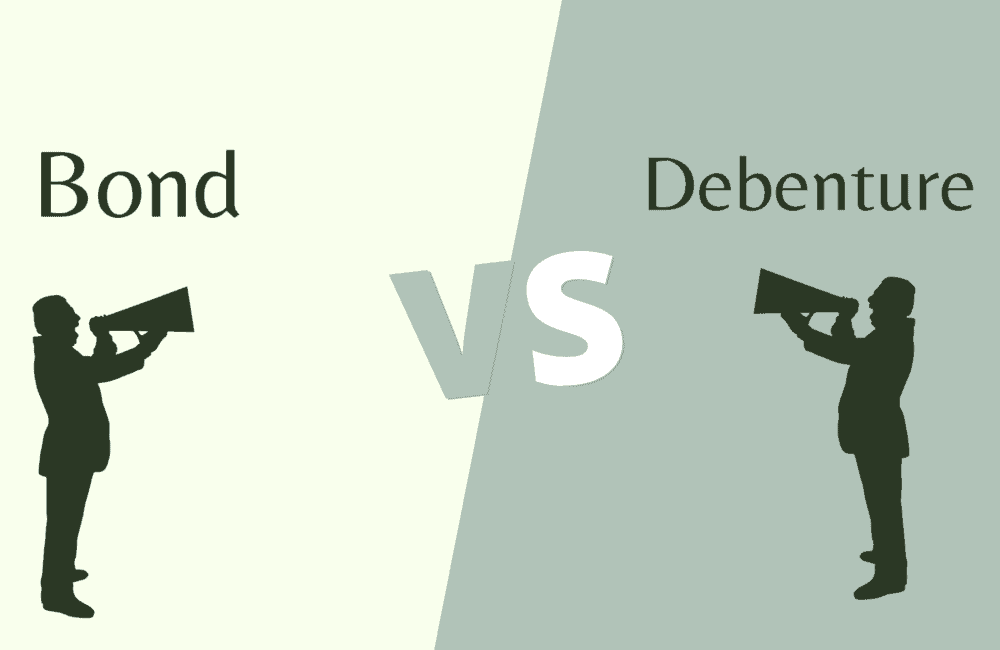Every business, no matter how small or big needs financing to ensure the smooth running of its operations. Financing is required when setting up, sustaining, or expanding a business. To gather funds, there are many ways a company can borrow money. To borrow, these companies provide debt instruments like bonds and debentures.
What Is A Bond?
A bond is a type of loan that is issued to raise funds or capital. Generally, they’re issued by corporations or government agencies. When an investor loans the company a certain amount of money, the company then pays back over time, with interest.
What Is A Debenture?
A debenture is also a type of bond that is not secured by collateral or an asset. This means that if the company which issued the debenture cannot pay back the loan amount, then the investor may not get their invested money back.
The bonds and debentures are instruments that are issued by a business or even the government to gather funds. Generally speaking, bonds are issued by big bodies like government agencies or huge corporations. On the other hand, a debenture is issued by small public companies to gather funds from the market. Even though their primary function is to raise funds for the issuer, they have many fundamental differences.
Differences Between Bond And Debenture
| Sr. No. | Bond | Debentures |
| 1 | Bonds are issued by government agencies or big corporates or financial bodies | Debentures are issued by private companies |
| 2 | Bonds are secure | Debentures can be both; secured and unsecured |
| 3 | Investing in bonds is comparatively less risky | Investing in debentures is has high risk |
| 4 | Bonds get first priority during liquidation of the company | Debentures get paid out only after the bond holders during liquidation |
| 5 | Bonds give a lower interest rate | Debentures give higher interest rates |
Bond Vs Debenture – Explanation
- Bonds can be issued by government agencies as well as by private organizations for raising funds from the public. Debentures can be issued by private or public companies for raising funds from their investors.
- Bonds are secured by the assets of the issuer whereas debentures are not secured by any physical assets or collaterals. Debentures are issued and purchased only on the word of mouth, credibility, and reputation of the issuing company.
- Since bonds are more secure and have a lesser risk factor, the interest rate for bonds is also lower. While on the other hand, since debentures are less secure and have a higher risk factor, the interest rates are higher. Bonds have high stability for repayment. Whereas debentures are not backed by collaterals, therefore, offering a high rate of interest.
- A bondholder may receive the interest in monthly, half-yearly, or annual manner, and are constant payouts. This is because the bonds are not subject to the performance of the issuing company. Whereas a debenture’s interest rate varies depending on the performance of the issuing company, and the payouts are periodic.
- At the time of liquidation of the company, the bondholders are always given preference. The bonds are paid out first. Only then, the debentures are liquidated by the company. This results in very high risk because sometimes, there might not be enough funds to pay back to the holders.
- More often than not, bonds are long-term investments as compared to debentures issued by a company.
Recommended: Types of Inflation
Bonds Vs Debentures – Final Thoughts
While investing, one must factor in the amount of money they are going to invest in and the amount of risk they are willing to take. Since bonds and debentures both are a form of investment, the difference lies in their instruments. A bond is secured by an asset while a debenture is not, but the returns are always high with debentures. If you can factor in the risk and assure the creditworthiness of the company then buying debentures can prove to be more profitable.
But if you are uncertain and still trying your hand in the field of investment then bonds are a better choice. Investing in bonds guaranteed since these are issued by government agencies. However, if you are willing to take the risk to invest in debentures, they are more potent in giving higher returns.
Also Read: Ultimate Guide to Hedge Funds in India
Frequently Asked Questions
Why Do Companies Issue Debentures?
Companies issue debentures to collect capital needed by them only for a limited period also called public borrowing. Many times, a company repays the investor when the company acquires enough funds.
Who Is A Bondholder Or A Debenture Holder?
An investor who pays money to buy a bond or a debenture issued by the company is its holder. Depending on the offer document, the holder gets payouts on their investments.
How Long Can You Hold A Bond?
Bonds can be referred to as being short, medium or long-term. Generally, a bond that matures in one to three years is referred to as a short-term bond. Medium or intermediate-term bonds generally are those that mature in four to ten years, and long-term bonds are those with maturities greater than 10 years.
How Are Bond’s Interests Paid?
The company pays an interest expressed as a percentage of the amount invested by the investor. The company pays the interest rate at intervals such as which can be paid monthly, half-yearly or annual and returns the principal on the maturity date, ending the loan.
What Happens When A Bond Is Matured?
When a bond reaches maturity, the investor receives the invested amount in the bond and any interest that has accumulated since the last time the interest payment was made. If the interest was not paid out periodically, then the investor receives all of the interest and the invested amount since the bond was issued.
What Is Meant By The Issue Of Debenture?
The procedure of issuing debentures by a company is similar to that of the issue of shares. In which case, issuing debentures is where a company provides a certificate under its seal as an acknowledgment of debt taken by the company from their investors. A prospectus is issued, applications are invited, and letters of allotment are issued.



